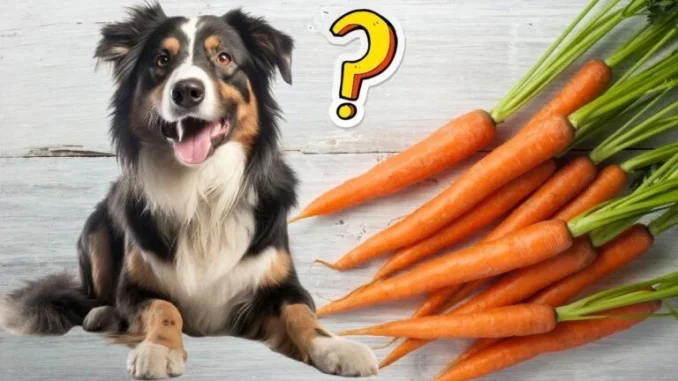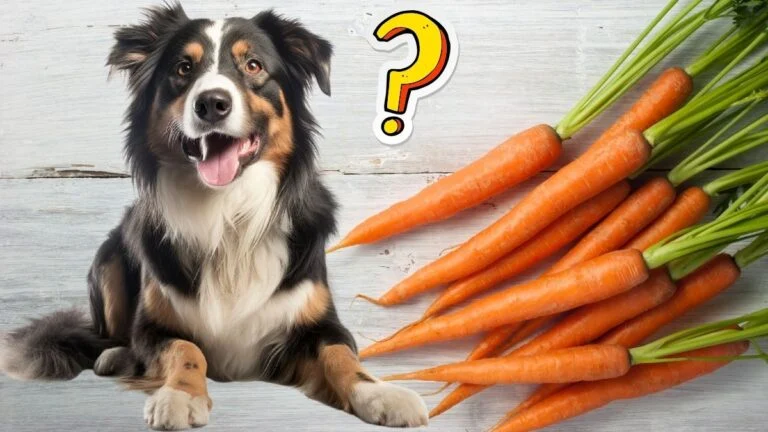
It is no secret that carrots are a staple in many households and can be found either in salads, stews, or snacks. But as a dog owner, you might wonder: Can dogs eat carrots? The answer is a resounding yes! Carrots are not only safe for dogs but also packed with nutritional benefits. However, like any food, there are important considerations when offering them to your furry companion. Let’s explore everything you need to know about dogs and carrots.
Expert Key Takeaways
-
Dogs can enjoy carrots as treats because they are safe, nutritious, and versatile.
-
In order to prevent choking or overfeeding, you should always serve them in appropriate portions.
-
When introducing carrots to your dog for the first time, keep an eye out for any adverse reactions.
-
As a supplement to a balanced diet, carrots should be used as a supplement, not as a replacement.
Why Are Carrots Safe for Dogs?
Carrots are a nontoxic vegetable for dogs. They are naturally low in calories, high in fiber, and loaded with essential vitamins. Unlike some human foods that pose risks (like chocolate or onions), carrots are generally well-tolerated by dogs of all breeds and sizes.
Nutritional Profile of Carrots
Carrots are a powerhouse of nutrients, making them a healthy treat option. Here’s a quick breakdown of their nutritional benefits:
| Nutrient | Benefits for Dogs |
|---|---|
| Vitamin A | Supports eye health, skin, and coat |
| Fiber | Aids digestion and promotes gut health |
| Beta-Carotene | Acts as an antioxidant and boosts immunity |
| Potassium | Regulates heart and muscle functions |
| Vitamin K | Essential for bone health and blood clotting |
Benefits of Feeding Carrots to Dogs
1. Improved Dental Health
Chewing on raw carrots can help clean your dog’s teeth, reducing plaque and tartar buildup. They act as a natural toothbrush, especially for teething puppies.
Personal Insight: “When my Labrador, Max, was a puppy, I gave him chilled carrot sticks to soothe his gums during teething. Not only did it work wonders for his discomfort, but it also kept him occupied for hours.”
2. Low-Calorie Treat
Carrots are a guilt-free snack for dogs, especially for those prone to weight gain. One medium-sized carrot contains only about 25 calories, making it a perfect reward during training sessions.
3. Eye Health Boost
The beta-carotene in carrots converts to Vitamin A, which supports good vision. While dogs don’t develop conditions like macular degeneration as humans do, this nutrient is vital for maintaining healthy eyesight.
4. Digestive Aid
The fiber content in carrots supports regular bowel movements. If your dog occasionally struggles with constipation, carrots can be a natural remedy.
How to Serve Carrots to Dogs
1. Raw Carrots
Raw carrots are crunchy and satisfying for dogs. They’re best served as small slices or sticks to prevent choking hazards.
Pro Tip: Freeze carrot sticks for a refreshing summer snack or teething relief.
2. Cooked Carrots
Steaming or boiling carrots softens them, making them easier to digest, especially for senior dogs or those with dental issues. Avoid adding seasonings, butter, or oils.
3. Grated or Pureed Carrots
Mix grated or pureed carrots into your dog’s regular meals for a nutrient boost. This method is especially beneficial for picky eaters.
Potential Risks and Precautions
While carrots are safe for most dogs, there are a few things to keep in mind:
1. Choking Hazard
Large, uncut carrots can be a choking risk, particularly for small dogs. Always slice or chop them into manageable pieces.
2. Allergic Reactions
Although rare, some dogs may have an allergic reaction to carrots. Watch for signs like itching, swelling, or diarrhea after feeding them for the first time.
3. Sugar Content
Carrots are naturally sweet, so moderation is key, especially for diabetic dogs. Consult your vet if your dog has a medical condition before incorporating carrots into their diet.
How Much Carrot Can Dogs Eat?
Portion control is essential to avoid overfeeding. Here’s a simple guideline based on your dog’s size:
| Dog Size | Daily Carrot Allowance |
|---|---|
| Small (5–20 lbs) | 1–2 baby carrots or equivalent |
| Medium (20–50 lbs) | 2–3 baby carrots or equivalent |
| Large (50+ lbs) | 3–5 baby carrots or equivalent |
Note: Treats, including carrots, should make up no more than 10% of your dog’s daily caloric intake.
Real Reviews: What Do Dog Owners Say?
We asked dog owners about their experiences with feeding carrots to their pets. Here’s what they had to say:
- “My Chihuahua loves grated carrots mixed into her kibble. It’s her favorite treat!” Emily S., New York
- “Carrots are my go-to for training treats. They’re healthy and affordable.” Josh M., Texas
- “My senior dog struggles with digestion, but steamed carrots work wonders for him.” Priya R., California
Carrots vs. Other Dog-Friendly Vegetables
| Vegetable | Key Benefits | Drawbacks |
|---|---|---|
| Carrots | Low-calorie, promotes dental health | Potential choking hazards |
| Green Beans | High in fiber, great for weight loss | May cause gas in excess |
| Sweet Potatoes | Rich in Vitamin A, aids digestion | High in carbs, so moderation is needed |
| Broccoli | High in Vitamin C and K | Can cause stomach upset in large amounts |
Frequently Asked Questions
1. Can puppies eat carrots?
Yes! Carrots are safe for puppies. Serve them in small, soft pieces to avoid eating hazards.
2. Are carrot tops safe for dogs?
Carrot greens are non-toxic but can be tough to digest. It’s best to avoid feeding them.
3. Can carrots replace dental chews?
While carrots help reduce plaque, they don’t replace the effectiveness of specialized dental chews or regular brushing.
4. What if my dog doesn’t like carrots?
Not all dogs enjoy carrots. Experiment with different serving methods, like steaming or mixing them with other foods.
5. Are baby carrots better than regular carrots?
Both are equally nutritious. Baby carrots are more convenient but often pricier.
Final Thoughts
As a dog owner, I’ve found carrots to be one of the simplest, healthiest snacks for my pets. They’re affordable, packed with benefits, and loved by most dogs. Whether served raw, cooked, or grated, carrots can be a delightful addition to your dog’s diet.
Remember, every dog is unique. When introducing any new food, always consult with your veterinarian to ensure it aligns with your pet’s dietary needs.
External Resources for Further Reading

Leave a Reply